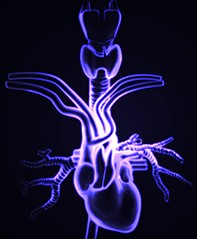Peer Reviewed
Perspectives
Cardiac effects of thyroid disease
Abstract
Thyroid hormone has important actions on the heart, and thyroid dysfunction can cause significant adverse cardiovascular effects. Thyroid dysfunction occurs on a spectrum ranging from subclinical disease to overt thyrotoxicosis or hypothyroidism. This article addresses the cardiovascular manifestations of both subclinical and overt thyroid dysfunction, and suggests potential indications for treatment to improve cardiac outcomes.
Key Points
- Overt thyrotoxicosis can cause marked cardiovascular abnormalities, including tachyarrhythmias, heart failure and pulmonary hypertension.
- Subclinical hyperthyroidism is associated with adverse cardiac effects, including increased cardiovascular mortality. These risks are most pronounced in older patients.
- Overt hypothyroidism has cardiovascular effects that are, in many ways, opposite to those seen in thyrotoxicosis.
- Mild elevations in serum thyroid-stimulating hormone levels (<10 mIU/L) can occur with normal ageing. Subclinical hypothyroidism perhaps poses a greater cardiac risk to younger patients with underlying coronary heart disease or other cardiovascular risk factors.
- The decision of whether or not to treat a patient with subclinical thyroid dysfunction needs to be individualised. Factors such as age, underlying cardiac status and degree of subclinical dysfunction are all important considerations.
Picture credit: © Medical/SPL
Purchase the PDF version of this article
Already a subscriber? Login here.

